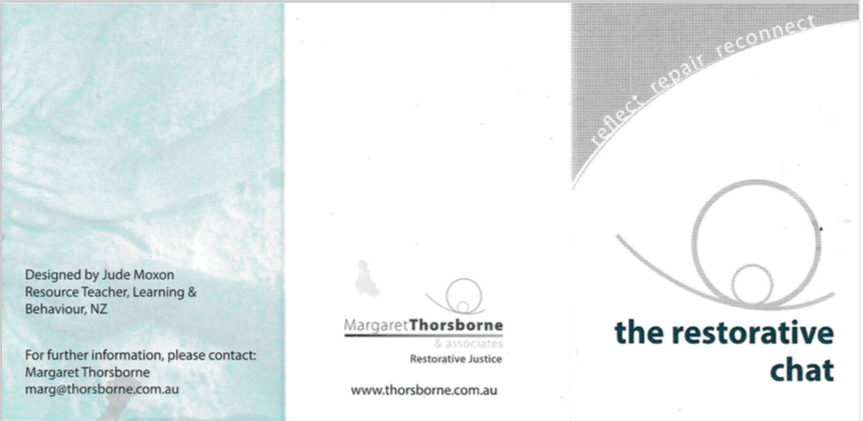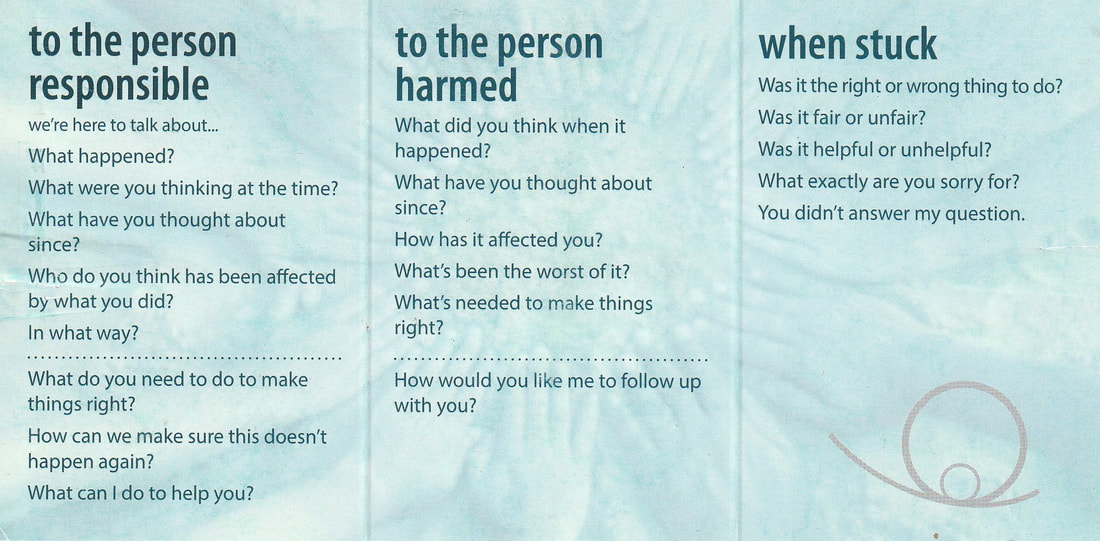Maintaining Care in Schools Through Restorative Practice
Margaret Thorsborne's Restorative Practices K-12 and Residence training sessions at Branksome Hall Asia in 2017 gave me a practical toolkit for living and learning with the students in BHA Residence. Her training provided me a unique insight into the boarding and day students' similar, but different, needs. The collaborative sessions were created by the necessity of school-wide participation, and it gave us Residence Dons a platform to advocate for our students' needs which so often go unseen or unheard by their teachers. Over the course of months (and years, for some in the sessions) the Residence staff, classroom teachers, and school administrators were prepared to holistically integrate these relationship-based policies and restorative discipline strategies into every aspect of their classrooms and communications with parents. I participated in a small portion of the Residence program's development of RP policies, and the experience holds a large portion of my heart and my teaching philosophy.
The aim, as I saw it sitting in our groups for hours and equipped with our brains and tasty snacks, was to create a top-down and bottom-up approach to the schooling experience: a set of values and expectations for students, staff, and parents of BHA grounded in the maintenance of caring relationships. While I can't recreate that experience, I can try to integrate the principles I learned into my everyday teaching practice.
The aim, as I saw it sitting in our groups for hours and equipped with our brains and tasty snacks, was to create a top-down and bottom-up approach to the schooling experience: a set of values and expectations for students, staff, and parents of BHA grounded in the maintenance of caring relationships. While I can't recreate that experience, I can try to integrate the principles I learned into my everyday teaching practice.
- In addition to the "RP Training Notes 2017" resource below, use the Introduction to Restorative Practices handout created by Kristina Hulvershorn for the Peace Learning Center.
- A Dialogue for Parents is a great resource to start with, in addition to the basic Restorative Chat script below.
- Use the Informal Script, too, because the best restorative conversations are held with an open mind. Perhaps paradoxically, using a semi-structured interview guide can help you focus on actively listening to the responses of those involved because the questions will naturally arise through the conversation.
The Restorative Chat
In a Restorative Chat, all persons must be engaged in the conversation. If any person is not ready to have the conversation, you need to choose whether addressing the issue gets to the battle or the war. As a moderator, your priority is the physical, emotional, and mental safety of the people whose relationships have been broken. Make the conversation about behaviour and not about attitude or values because focusing on behaviour allows for a conversation grounded in objective information and observations.
Through a Restorative Chat, moderators are attempting to understand what each member needs and reach an agreement among members so that their needs are met. This involves establishing the history, data, evidence, and stories from all people involved so moderators can lay out the issues and ground the conversation in impartial information. This is done by meeting with each person separately before bringing them together.
Taking the time to talk and understand each person is important for showing that the relationship is valued. Restorative practice helps leaders ensure group members are comfortable, are safe, and are heard. Beginning the conversation in a way that says, I'm glad you both here. You are brave for coming together today because this is an issue we can resolve as a group, is crucial to maintaining impartiality as a moderator because it is the group's responsibility to mend relationships.
Taking the time to talk and understand each person is important for showing that the relationship is valued. Restorative practice helps leaders ensure group members are comfortable, are safe, and are heard. Beginning the conversation in a way that says, I'm glad you both here. You are brave for coming together today because this is an issue we can resolve as a group, is crucial to maintaining impartiality as a moderator because it is the group's responsibility to mend relationships.
|
Questions to ask the person responsible
(Begin, We're here to talk about...) - What happened? - What were you thinking at the time? - What have you thought about since? - Who do you think has been affected by what you did? In what way? - What do you need to do to make things right? - How can we makes sure this doesn't happen again? - What can I do to help you? |
Questions to ask the person harmed
- What did you think when it happened? - What have you thought about since? - How has it affected you? - What's been the worst of it? - What's needed to make things right? - How would you like me to follow up with you? |
Questions to ask when stuck
- Was it the right or wrong thing to do?
- What's been happening for you to feel this way?
- Was it fair or unfair?
- Was it helpful or unhelpful?
- What exactly are you sorry for?
- *You didn't answer my question
- Was it the right or wrong thing to do?
- What's been happening for you to feel this way?
- Was it fair or unfair?
- Was it helpful or unhelpful?
- What exactly are you sorry for?
- *You didn't answer my question


